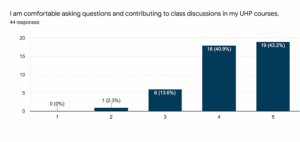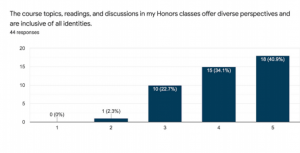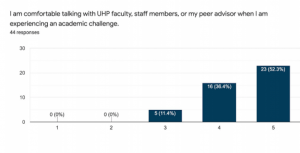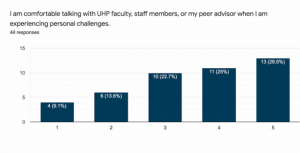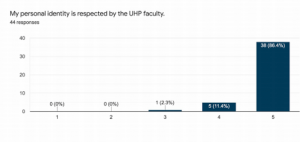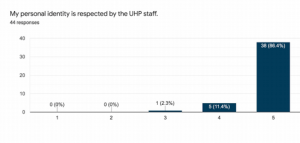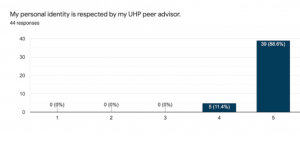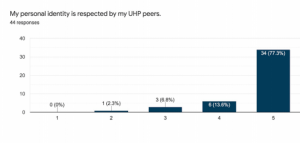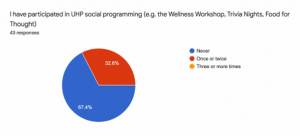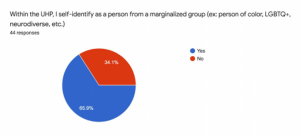In order to better understand the 2020-2021 first-year UHP student experience thus far, we created and sent out a survey to all first-year students on November 23, 2020. With this survey, we hoped to gain insight into ways in which we can grow and better support UHP students, particularly as it pertains to issues of diversity, inclusion, and community. All first-year students were strongly encouraged to respond. We received 44 responses out of a class of 108, and about 66% of respondents identified as a member of a marginalized group (ex: person of color, LGBTQ+, neurodiverse). Poll results are provided below. We present the full numerical results and a summary of responses to each open-ended question (rather than direct quotes) to respect respondent anonymity.
While we cannot know if the results are fully representative given the opt-in nature of the survey, the results are generally positive while also highlighting areas in need of continued work. A majority of respondents indicated comfort with contributing to class discussions and reaching out when they encounter academic challenges (though it is more difficult for students to reach out for support when encountering personal challenges). Most respondents also felt that UHP faculty, staff and peers respect their identity, though some peer-to-peer disrespect was reported, which indicates a continued need for the program to encourage respect amongst all participants. Most respondents provided positive responses when asked whether course topics, readings and discussion covered diverse perspectives and accompanying written responses also indicated student interest in continuing to have courses expand in this area, which the core UHP faculty are committed to doing and is one of our ongoing program goals. Not surprisingly, students also report feeling a significant amount of “Zoom fatigue” this year, which has impacted interest in and attendance at digital UHP events. We look forward to being back on campus during the 2021-2022 academic year and providing opportunities for community building that this first-year class unfortunately missed due to the COVID-19 pandemic.
These results are already informing UHP programming and will continue to do so in the future. We greatly appreciate that students took the time to complete this survey!
I am comfortable asking questions and contributing to class discussions in my UHP courses.
Scale: 1 (never) – 5 (always)
Average: 4.25
If you would like, use the area below to expand upon your response above.
- Many students reported that their honors classes felt like safe spaces where professors listened with care; many also felt more comfortable participating in UHP discussions than in their non-honors classes, due to the culture and small class size.
- In some cases, students stated that they struggled with “imposter syndrome,” particularly being in largely homogenous and majority-white or male spaces.
- Students also shared that while the open-mindedness of their peers made class participation easier and more comfortable, they sometimes felt intimidated participating out of fear of saying the wrong thing.
The course topics, readings, and discussions in my Honors classes offer diverse perspectives and are inclusive of all identities.
Average: 4.13
If you would like, please use the area below to reflect on your response above.
- While many students said they enjoyed their honors courses, they also expressed a desire to expand the text offerings from Greco-Roman, white or Asian male viewpoints.
- In some cases, students were appreciative of texts from marginalized identities (e.g. female, BIPOC) included in the syllabus.
- Some acknowledged that while the syllabi were not as diverse as they could be, they expressed appreciation for their professors’ encouragement to share unique and critical perspectives of the ancient texts.
I am comfortable talking with UHP faculty, staff members, or my peer advisor when I am experiencing an academic challenge.
Average: 4.4
I am comfortable talking with UHP faculty, staff members, or my peer advisor when I am experiencing personal challenges.
Average: 3.52
If you would like, use the area below to expand on your responses above.
- Students expressed hesitation (and in some cases difficulties) with reaching out for support due to the online learning environment and lack of in-person interaction and rapport-building.
- However, students largely expressed appreciation for the support they were able to receive from honors faculty, academic advisors, and peer advisors.
My personal identity is respected by the UHP faculty.
Average: 4.84
If you would like, please use the area below to reflect on your response above.
- Students reported positive experiences of honors faculty respecting and supporting their identities. This includes actions like using correct gender pronouns, and respecting which aspects of their identity students felt comfortable sharing or discussing.
My personal identity is respected by the UHP staff.
Average: 4.84
My personal identity is respected by my UHP peer advisor.
Average: 4.88
If you would like, please use the area below to reflect on your response above.
- In addition to reporting positive experiences with peer advisors, some students also expressed a desire to either be paired with a peer advisor of color or have identity-based support within the honors peer advisor program.
My personal identity is respected by my UHP peers.
Average: 4.65
If you would like, please use the area below to reflect on your response above.
- Students reported mostly positive experiences related to their UHP peers and claimed that their identities were respected by their fellow students.
- However, some reported frustrating experiences of their race being overly focused on in conversations with their peers, particularly when the topic wasn’t relevant or invited.
- Other students reported that the online learning environment did not provide many opportunities for peer-to-peer interactions and therefore didn’t have a basis for comment.
I have participated in UHP social programming (e.g. the Wellness Workshop, Trivia Nights, Food for Thought)
Never = 29
Once or twice = 14
Three or more = 0
What additional digital/virtual social programming would you like to see the UHP offer this year?
- Some student suggestions were: Q & A night with upper-class honors students; more trivia nights; unstructured online hangout time (programming without a “theme” or “goal.”)
If you have not participated in UHP social programming, are there any factors that would encourage you to participate in future events and activities? Are there any that have discouraged you from coming so far?
- Students overwhelmingly claimed that the online learning environment has impeded their ability to participate in events, activities, and extracurricular activities within the UHP.
- Students expressed screen-time “fatigue” and did not want to participate in additional virtual activities, as so much of their schooling (class, office hours, tutoring, student orgs) takes place online.
- Students also reported busy schedules, including family and work obligations.
Within the UHP, I self-identify as a person from a marginalized group (ex: person of color, LGBTQ+, person of color, etc)
Yes = 29
No = 15
